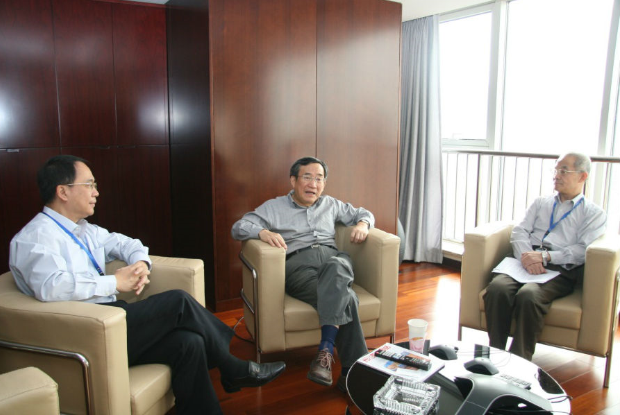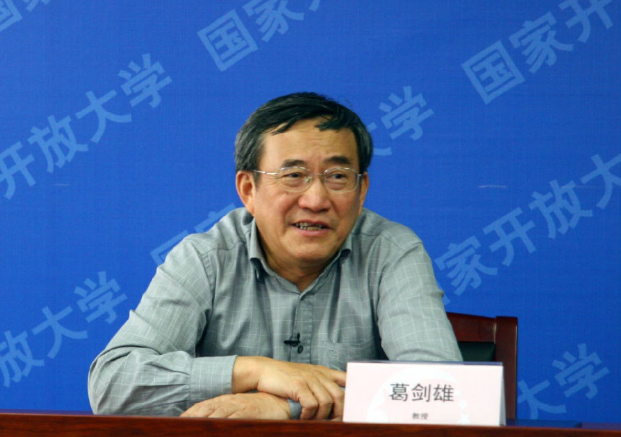
On October 10, 2013, Professor Ge Jianxiong, a member of the Standing Committee of The National Committee of the Chinese People’s Political Consultative Conference (CPPCC), social activist, renowned historical geography scholar and curator of the Fudan University Library, visited the Open University of China (OUC) to deliver his esteemed lecture “Economic and Cultural Regional Differences: Historical Geographical Basis of Chinese Economy and Culture”.

Yang Zhijian (left), president of the OUC, and Zhang Hui (right), vice president of the OUC, meet with Ge Jianxiong (center) ahead of the forum.

The lecture starts by asserting that Chinese history and geography no longer have strict traditional geographical constraints. Research has been extended from administrative regions, local names textual research and the changes of water channels to various branches of natural and human geography. The research range also extends to the exploration and summarization of laws from the surface to the centre and the restoration of phenomenon. Professor Ge claims that the geographic environment’s impact on human culture has shown that different regions have created different cultures. Meanwhile, Chinese historical geography and its various civilizations and cultures have helped shape China’s splendid modern culture. Through analysis of geographical environments in marine culture and capital transfer, Professor Ge stressed that the examination of geographic environments should focus on itself as well as its surroundings. Professor Ge emphasized the functions of human environment on human society development. He also pointed out that when we analyze objects from a historical geographical perspective, we ought to be clear about the interaction of various factors and adhere to the facts. He vividly compared Chinese mariner Zheng He’s great voyages around the South China Sea, the East China Sea and across the India Ocean Ocean to to East Africa, and Italian explorer Christopher Columbus’ voyages around the world. Professor Ge also touched on the unique exploration of “traditional cultures”, specifically dialects, dwellings, folk festivals and religions. Professor Ge’s lecture showed the past as well as the present. Profound theories were explained in simple language, demonstrating his style as a famous scholar. His talk received a warm reception in the lecture hall that had no empty seats. Many teachers listened from the corridor and showed great interest.
Ge Jianxiong is a member of the Standing Committee of the National Committee of CPPCC, distinguished history professor and curator of Fudan University Library and PhD supervisor. He is also the former director of the Institute of Chinese Historical Geography and the Historical Geography Research Centre at Fudan University under the Ministry of Education. His research interests include historical geography, historical population geography and the history of migration, environmental changes and cultural heritage. He has conducted academic exchanges many times at Harvard University and Cambridge University. In 1990, he was evaluated as a “great contributor to Chinese PhD recepients” by the Degree Council under the State Education Commission. He has published more than 20 academic books and more than 100 academic papers. Moreover, Professor Ge is also a member of the Academic Standards and Social Sciences Committees at Fudan University and deputy director of the Study Style Construction Committee under the Ministry of Education. His other titles include vice chairman of the Shanghai Society for Library Science, vice chairman of the Shanghai Historical Society and adviser to the Shanghai municipal government.
Since its inception in 2010, the Open University Forum has held 85 lectures that have covered scientific technology and humanities and social science. Members of the Chinese Academy of Sciences such as Zeng Yi and Wei Jiangchun in addition to famous scholars including Qiao Liang, Hong Zicheng, Khasbagan, Yan Jichang, Martin G Bean and John Daniel have all delivered speeches at the forum. The forum has the atmosphere of an academic lecture. Audiences in attendance can interact with experts, while others can view remotely via live online streaming video. This ensures teachers and students at the OUC (RTVU) system as well as social members can watch lectures and highlight the university’s open characteristics.
By Zhang Kun